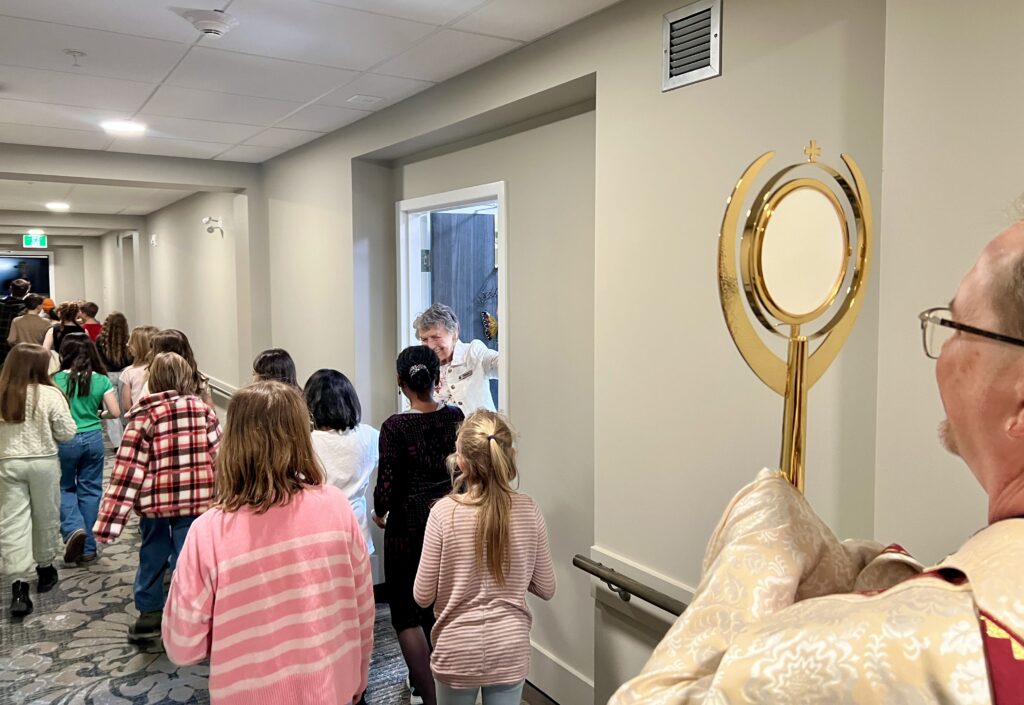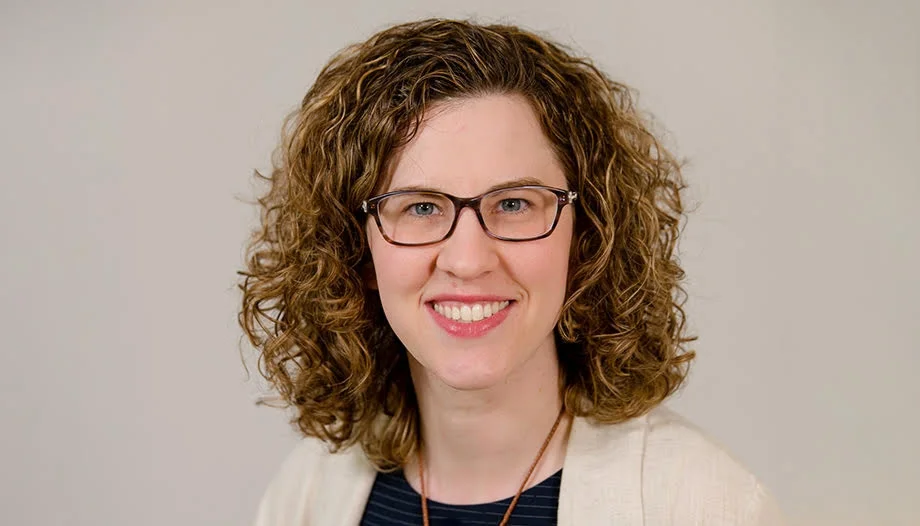Amanda Achtman is the founder of Dying to Meet You, a cultural and educational project that seeks to humanize the conversation about death and defend the dignity of all human life in the face of the advance of euthanasia in Canada and around the world. Through writing, short films and community meetings, Amanda proposes an alternative based on accompaniment, love and hope. In this interview, she shares the origin of her initiative - born as a personal blog during the legislative debate on the expansion of euthanasia - and reflects on how to restore our cultural health regarding our experiences of death and dying.
Amanda grew up in a Jewish-Catholic family, a dual heritage that deeply marked her worldview and her sensitivity to the dignity of human life. Her grandfather, a Polish Jew who managed to escape to Canada shortly before the outbreak of World War II, was one of the few survivors of a family almost annihilated by the Holocaust.
That family history and her early contact with suffering led her, at the age of 18, to participate in the "March of Remembrance and Hope," a trip to Germany and Poland together with Holocaust survivors. There, in front of the mausoleum of ashes at Majdanek and in St. Maximilian Kolbe's cell at Auschwitz, Amanda understood the depth of the value of each life and the responsibility to live with reverence and purpose. That experience of faith, memory and commitment prepared her for her current mission: to humanize the conversation about death and suffering through her project.
What motivated the creation of 'Dying to Meet You' and how has it evolved? How do you humanize the conversation about death and euthanasia?
-On January 1, 2021, I made a new year’s resolution to blog about death every day for an entire year. At the time, I was working as an assistant to a Canadian member of parliament. One of the key bills at the time, Bill C-7, would expand euthanasia to those living with disabilities or mental illness.
The MP put out a call for stories about how this expansion of euthanasia to persons with disabilities and mental illness would affect individuals and their loved ones. We received hundreds of emails in a single week. I was responsible for poring over these emails, and we resolved to respond appropriately to each one. Reading these stories made me feel like the parliamentary office had been transformed into a crisis centre. I was realizing the extent of suffering among my fellow citizens and knew that we had to have something better to offer than death.
Unfortunately, we were outnumbered in Parliament and the bill passed. Canada expanded so-called medical assistance in dying [MAID] to those who are not terminally ill.
I started blogging about death and dying as a personal project, really as my own catharsis from this experience of receiving all those emails. I was sure there had to be a more human way to suffer and die than hastening death. And so, my blog at DyingToMeetYou.com was an effort to address these issues of suffering, death, meaning and hope in a more humanized way.
At the time, I did not expect this blog would lead to anything else but God frequently has a way of multiplying our modest offering. After leaving Parliament Hill to study in Rome for two years, I returned to Canada ready to expand Dying to Meet You into the broader cultural project that it has become. Now, the Dying to Meet You Project involves a mix of writing, speaking, producing short films, and organizing community events. The videos are a key means by which I give voice to those most impacted but often the least represented in our public conversations surrounding euthanasia.
What challenges do you face in addressing controversial issues such as euthanasia, genetic discrimination and the rights of people with disabilities?
-The challenges that I face are inherent to these practices themselves. Euthanasia and eugenics are dehumanizing because, through these practices, human beings are discarded, dismissed, and discounted.
Sometimes people think that euthanasia is not so bad, since the person him or herself is asking for it. However, I think this is precisely what makes euthanasia so sad. The request for euthanasia betrays a lack of self-esteem and a low self-worth whereby the suffering or dying person doubts that anyone could love them enough to give them the care, support, and accompaniment they need to live well until they die.
Many people with disabilities tell me that they are getting the pitying message from others, “I’d rather be dead than be you.” To presume that life with certain vulnerabilities makes life less worth living is dehumanizing to those currently living with those vulnerabilities. It also makes everyone more precarious by insinuating that life could ever become less worthwhile. Ultimately, as some disabled Canadians like to remind their fellow citizens, we are all “temporarily able-bodied.”
I think one of the biggest challenges I face is helping those with conceits about their autonomy and independence (conceits from which I am not immune, either) see the consequences of this worldview on others and even on their (our) future selves.
How do you think modern society can avoid making judgments about the value of life based on arbitrary or medicalized criteria?
-The most important remedy is encounter and presence. When we meet others and spend time with them, we see that they and we are capable of more than we expected. Lord Rabbi Jonathan Sacks liked to say, “It’s the people not like us who make us grow.”
It is natural for parents to fear the unknown when their unborn child receives a challenging prenatal diagnosis or for someone with dementia to become fearful about how they and their family will manage. But what makes any and all of these experiences capable of being borne nobly and meaningfully is love. We need examples around us of bearing life’s challenges with fortitude and in community.
This is why I like to organize events in which community members give testimonies that touch on themes of human dignity and fragility, including: adoption, disability, mental health, cancer, aging, accompaniment, and end of life. The more that we have the opportunity to contend with these experiences and to make meaning from them together in community, the more we will humanize the culture.
What changes have you observed in the people who participate in 'Dying to Meet You' workshops and events?
-One of the most surprising things is that I have never had someone who did not want to speak with me about their experiences of suffering and death. Whether interviewing someone for a blog post, speaking casually over coffee, or creating a short film about someone’s story, people are extremely willing to open up about these topics. In fact, many seem so relieved to finally have the opportunity to speak about the things that matter ultimately.
One of the most special events I organized earlier this spring was a Eucharistic Procession through a retirement residence in Regina, Saskatchewan. It was also an experience of intergenerational encounter because Grade 4 students participated in the Procession throughout the four-floor residence. A high school student served as the cross bearer, the Grade 4 boys rang bells (not too loud!), and the Grade 4 girls dropped flower petals (artificial ones!) as the Blessed Sacrament was processed and stopped before each resident’s door. The residents stood in their doorways waiting for Our Lord and bowed with such reverence and appreciation that Christ had come to Him like this.
It is hard to describe what was stirred in the souls of the children, the elderly, and even the staff at the residence. But, there is no doubt that everyone was deeply moved. This is the purpose of Dying to Meet You, to do simple apostolic experiments like this that take people by surprise but that are totally ordinary treasures of our faith that we can help bring about the “revolution of tenderness” of which Pope Francis often spoke

What is your main message to young people and adults regarding respect for life in all its stages?
-I recently had the great joy of attending the Canonization Mass of Saints Pier Giorgio Frassati and Carlo Acutis in St. Peter’s Square in Rome. The entire homily is worth reading. In it, Pope Leo says, “Even when illness struck them and cut short their young lives, not even this stopped them nor prevented them from loving, offering themselves to God, blessing him and praying to him for themselves and for everyone.” Whether we are young or old, our origin and our destiny is love.
In the same homily, Pope Leo exhorted us saying, “Dear friends, Saints Pier Giorgio Frassati and Carlo Acutis are an invitation to all of us, especially young people, not to squander our lives, but to direct them upwards and make them masterpieces.”
When we realize what a tremendous gift our lives are and that we are not our own, we will not squander them. We will not waste time, we will not cut life short. Our lives become masterpieces not because we finish them unscathed, but because we fight the good fight, finish the race, and keep the faith. (2 Tim. 4:7)
You speak of a "death without culture" instead of a culture of death. Can you explain this concept? Is there any hope of changing this culture? What can we "ordinary" Christians do?
-Yes, what I mean by “death without culture” is that we are losing the customs and rituals around death and dying. We are losing the cultural mores around dying well. For Catholics, it is important to bolster catechesis on the Last Things (death, judgment, heaven, and hell), the Sacrament of the Anointing of the Sick, Catholic funeral rites, and other topics in this vein.
The Church has such a rich tradition that can help us experience these realities in ways that are adequate to both our humanity and our hope for eternal life.
Christians can look for occasions to catechize on end of life themes in parish, school, and care home settings. Parishioners can start and develop ministries committed to bringing Communion to those who are sick at home, in hospitals, or in retirement homes. Those involved in funeral choirs or funeral luncheon ministries can invite younger people to join as volunteers. Funerals themselves can be catechetical opportunities for clergy and lay people to explain the meaning of symbols like the pall, Paschal candle, holy water, flowers, etc. Making an annual retreat can present an occasion to consider the Last Things. Bringing generations together at schools and retirement homes can foster intergenerational solidarity and reflection on God’s faithfulness from age to age. There are boundless ways for us to promote a culture of life that is truly cultural! I’d love to hear your ideas!







